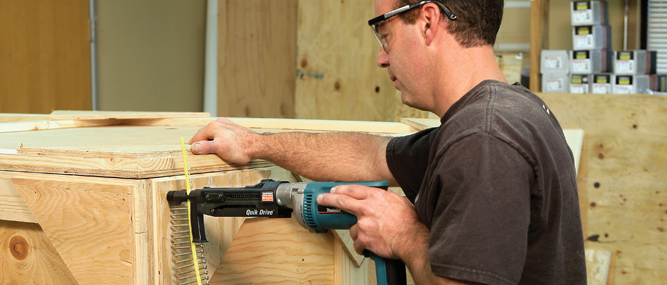The fasteners that Simpson Strong-Tie offers its pallet and crate manufacturing customers today are designed to make their jobs easier and faster, and are better as a result of working with these customers to help them solve problems.
“We try to be a solution provider for any size company. It’s a value Simpson built its whole company on,” according to Ed Sutt, vice president of the Fastening Systems division of Simpson headquartered in Gallatin, Tennessee.
Begun in 1914 in the San Francisco Bay Area as a window screen company, Simpson Strong-Tie really took off in the 1950s when a neighbor asked Barclay Simpson, who’d taken over the business from his father, if he could make structural connectors for the ends of 2x4s for a roof.
The making of that first joist hanger led to the creation of Simpson Strong-Tie, which today is a global company with more than 1,800 employees, and nine U.S. and 10 international manufacturing locations.
The company is really known for its joist hangers, hurricane straps, and fasteners for wood and steel in residential construction, said Sutt, who previously worked for Stanley Bostitch, and started an initiative to more closely work with the pallet industry when he came on board at Simpson.
Since then, there have been a number of what he calls “real-life conversion stories” where Simpson has really added value to its pallet and crating customers operations. For example, Simpson worked with one company where employees were using one drill to pre-drill holes, then switching to another to drive screws. All the while the plant floor was littered with washers, which employees would drop while trying to place.
Switching to Simpson’s Strong-Drive® SDWS TIMBER Screw meant employees no longer had to pre-drill, and because the screws have an oversized flat head, washers were eliminated entirely. This made the process much faster and also eliminated waste in dropped fasteners. Another company switched to the SDWS TIMBER Screw, available in 2.5"-15" lengths, from a standard hex-headed lag screw because it wanted crates to slide flush together. Another company made the switch because the screw’s point and thread make it easier to drive faster at a low-torque, while reducing problems the company had with wood splitting.
Another product that has been a big hit with pallet and crating customers is Simpson’s Quik-Drive collated screw system. The system uses every single screw on the strip and will not jam, Sutt said.
Going from bulk screws to a collated system is a great way to increase speed on the assembly floor by up to 50%, he said. That’s because workers assembling pallets or crates no longer have to hold screws in place while drilling. “What’s nice about the Quik-Drive system is anyone at any skill level can do it like they’ve been doing it for years,” he said. This means that new or inexperienced employees can more easily handle assembly work.
“The fastener is really the key component to the strength of the overall system, and that goes generally for any kind of wood construction,” said Sutt. While some pallet and crate manufacturers use nails and staples because of how their pallets are used, screws are crucial when making pallets and crates for shipping high-value products, when a pallet simply requires more holding power, or where a portion of the pallet may need to be disassembled and reassembled, for an inspection, for example.
One customer in Australia uses the system for building crates used to ship chemicals. Sutt said that he got to see the system some full circle when a $50,000 piece of heavy equipment for manufacturing screws was delivered to the Gallatin plant on a pallet built with its very own Quik-Drive screws which are made and collated right there.
For more information, visit www.strongtie.com/crate or call 800/999-5099




